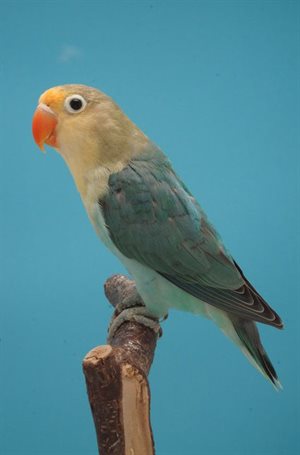
LovebirdsPhoto by: Dirk van den Abeele)
The Bird 10,000 (B10K) consortium’s paper that appears in the journal Nature: Dense sampling of bird diversity increases power of comparative genomics, by Feng, Stiller, Deng, Armstrong et al., was released on 11 November and includes contributions of more than 150 researchers from 125 institutions in 24 countries on various bird species. The NWU’s contribution on the genomics of lovebirds is based on the research of Dr Henriëtte van der Zwan.
“It is a great privilege that the research for my PhD has been included in the study,” says Henriëtte. She explains that her study, which started in 2015, entails the sequencing of the genome of the rosy-faced lovebird, a southern African parrot species. This has led to the development of a test to determine parentage that is based on her findings.
“Although my research is a smaller piece of the much bigger B10K bird consortium study, I believe the NWU’s contribution is of special importance.” Henriëtte says that taking into account that close to 40% of all parrot species are considered to be endangered, she believes the study could contribute to the conservation of parrots in general.
“There is a great need for this study, as there is currently no similar research available. The NWU is the only institution that focuses specifically on the genetics and genomics of lovebird breeding or lovebirds as pets.”
Henriëtte’s study leader and subject head for Biochemistry in the Human Metabolomics research focus area, Dr Rencia van der Sluis, echoes the importance of the study. “The NWU is currently the leader in the field of lovebird genetics and this research further contributes to the understanding of lovebird genomics.”

Dr Henriëtte van der Zwan’s research on lovebird genetics is included in the prestigious Nature B10K bird study.

Dr Rencia van der Sluis, subject head for Biochemistry in the Human Metabolomics research focus area.
She says the NWU was the first to publish the de novo genome (a novel genome where there is no nucleotide reference sequence available) for any of the lovebird species and this is still the only genome available for the Agapornis (lovebird) genus.
“From the genomic data we developed a genetic-based test for the parentage verification of lovebirds. We subsequently collaborated with the B10K genome project to form part of the large international study on the evolution of birds.”
Both Rencia and Henriëtte believe that the study into lovebird genomics is also a gateway to further related studies. They would like to identify genetic markers linked to plumage coloration, which is of economic importance to breeders. It is something they would like to pursue if they can secure additional funding to do so.
FR Bezuidenhout of Technology Transfer and Innovation Support at the NWU says the university filed a United Kingdom provisional patent. “We are currently in negotiations with an international company with a significant market presence in the Middle East and Asian territories that is interested in licensing the rights to the invention.”
He says this is a very unique project to be part of, as it offers a niche market segment for commercialisation. “We are excited about the commercial possibilities. This exemplifies how NWU researchers are delivering innovative research outputs with the potential to be commercialised.”
To read more about the Nature B10K bird paper and the contributions of international authors, visit: https://www.nature.com/articles/s41586-020-2873-9 and https://www.sciencedaily.com/releases/2020/11/201111122832.htm
